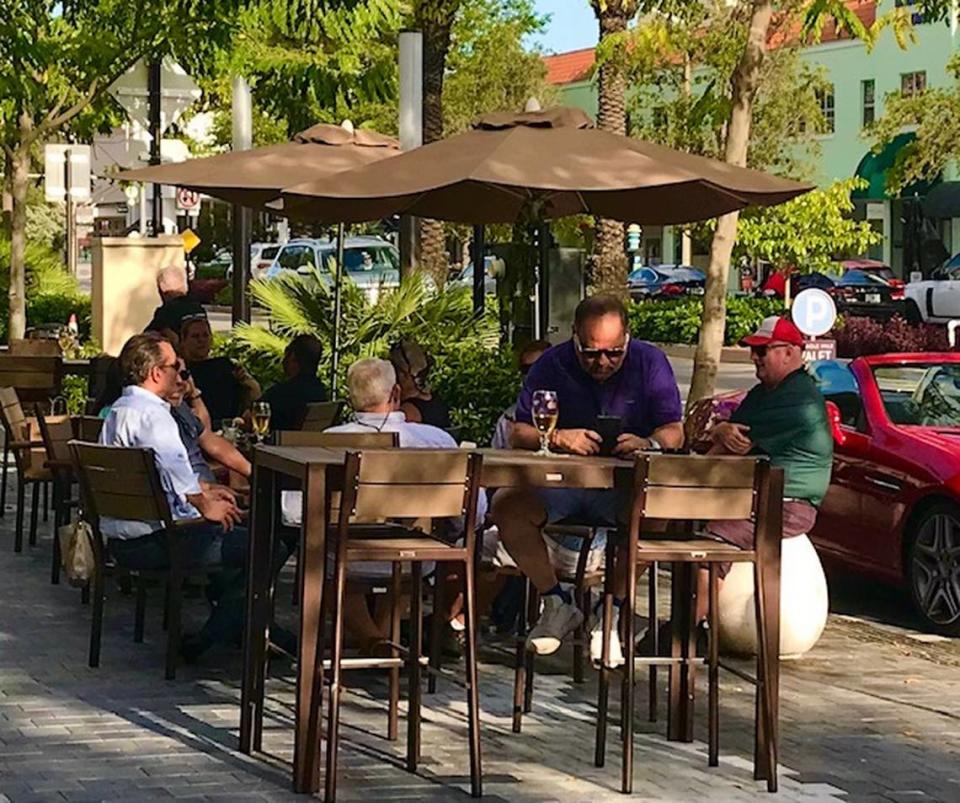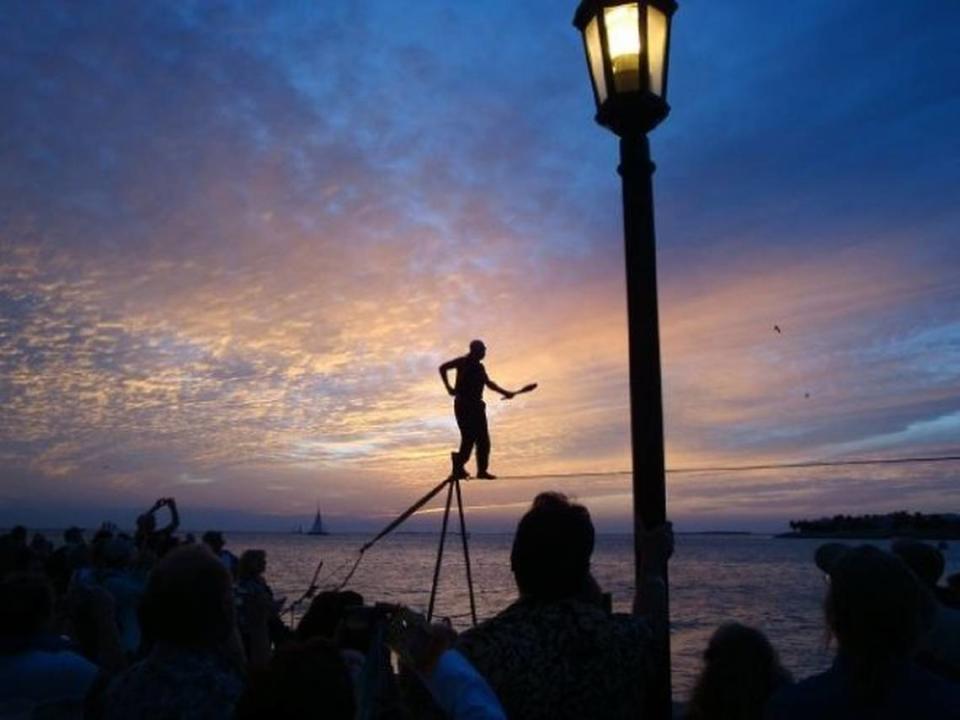Sweeping dine-in restaurant closures set for Miami-Dade after Trump call for stricter limits
Note: The Miami Herald and McClatchy news sites have lifted the paywall on our websites for this developing story, providing critical information to readers. To support vital reporting such as this, please consider a digital subscription.
South Florida cities clamped down over the weekend on public gathering spots, ordering restaurants to limit customers and hours and shutting down beaches to combat the spread of coronavirus — then, one day later, President Donald Trump suggested the rules needed to get even tighter: That gatherings should be no larger than 10 people.
The announcement Monday left South Florida governments and businesses scrambling to overhaul policies to curb a fast-spreading pandemic quickly tightening its squeeze on everyday life and the world’s economy.
The city of Miami made the first big move Monday evening, with Mayor Francis Suarez telling the Miami Herald that the city plans to close restaurant dining rooms and bars — only permitting takeout, drive-through, drive-in and delivery to occur.
“It will be modeled after [what has happened in] Dallas and Los Angeles,” Suarez said in a video call.
By late Monday, it was clear the closures would expand across much of the county. A source told the Miami Herald that both Miami Beach and Miami-Dade County will announce similar steps, outright closures of restaurant dining rooms, bars, nightclubs, entertainment venues and gyms. The announcement was scheduled to be made at a joint press conference with Miami Beach leaders at Joe’s Stone Crab, the iconic Miami Beach restaurant, and feature a representative of Cafe Versailles, one of Miami’s most famous restaurants.
But even as Florida was gearing up for Tuesday’s presidential primary election, it was still unclear how widely the stricter, but not mandatory, guidelines would be adopted across South Florida and the rest of the state.
Gov. Ron DeSantis, during a press conference Monday, said he wanted more time to evaluate. He acknowledged hot-spot areas may have to close some businesses entirely, but he stopped short of endorsing near-total shutdowns such as those in New York, Chicago and Los Angeles.
“At the end of the day, we’re dealing with this in a thoughtful way,” DeSantis said. “We’re not going to panic.”
Previous policies outlined by federal public health experts put the suggested limit on groups to 250, then that cap was reduced to 50 over the weekend with little explanation of the science behind the numbers. Trump, citing new national guidelines intended to curb the spread of the virus that causes the disease COVID-19, said Americans should also stop discretionary travel and stay out of dine-in restaurants and bars for at least the next 15 days. He also suggested the crisis might extend into July or August.
In Coral Gables, the city wasn’t ready to wholly shut down the eateries along Miracle Mile. The city was still following the county mandate to close bars, clubs and restaurant dining rooms by 11 p.m., with takeout and delivery available after that.

“I hope we don’t have to take the measures that were mentioned today by the president,” said Coral Gables Vice Mayor Vince Lago, who acknowledged that the city may have to go to an “only take-out model” if crowds continue to pose a threat.
Suarez, the Miami mayor, said the city could also shutter nightclubs, theaters, gyms and fitness studios, following similar closures in Dallas and Los Angeles. He added administrators were finalizing the details before issuing the official order Monday night. Business owners will likely be given a day to ramp down dine-in operations and pivot to takeouts and deliveries.
Restaurants across the region were already bracing for devastating impacts.
For Flanigan’s, the popular casual chain, the plan is to comply with local rules and shut the doors if the crowd triggers new limits imposed by local governments. A typical Flanigan’s seats about 200 people, so the restaurants will only allow the first 100 customers inside, said Jim Flanigan, CEO of the family-run chain.
“Not sure of the demand yet,” he said Monday in a text message. Flanigan said he’s keeping a full staff even as sales falls. For the chain’s kitchen staff, “missing one paycheck would cripple them.”
Asked about the White House request, Flanigan said: “I think that’s right around the corner. We would become a takeout/delivery operation.”
The effect of the spread of COVID-19 continued in Florida on Monday evening as state health authorities announced that 160 people have now been diagnosed with the respiratory illness. Five Floridians have died from COVID-19. Those numbers were expected to continue to rise. Across the world, the World Health Organization reported on Monday, the number of confirmed cases around the globe had risen to 167,511, including 6,606 deaths.
The pandemic will not stop voting for the Florida primary on Tuesday, even though other states have postponed their elections.
“Florida is proceeding with tomorrow’s election,” Secretary of State Laurel Lee said on Monday. “We are confident that voters in Florida can safely and securely go to the polls and cast their ballot.”
Also on Monday, the U.S. stock market experienced its worst day in decades — the S&P 500 closed down nearly 12 percent — as it became clear the world economy was headed into a recession.
The economic impacts were being felt in Florida, where governments are clamping down on businesses and shuttering landmarks familiar to residents and visitors alike.
In Orlando, Universal Orlando said it was closing down Universal CityWalk at midnight Monday, and all hotels at Universal Orlando Resort as of 5 p.m. on Friday. Likewise, Disney announced Monday that all of its Disney World resorts would also be shutting down to ward off the spread of the virus.
On Sunday, Miami-Dade county announced it would force bars, restaurants and nightclubs to close at 11 p.m., and capping patrons in eateries at up to 250 people at a time. Miami Beach and Fort Lauderdale closed their public beaches and ordered “non-essential” business to close by 10 p.m.
“While we have not imposed a total shutdown of restaurants, bars and clubs, it is not unlikely that some version of this is in the cards in the very near future,” Miami Beach Mayor Dan Gelber said on Monday. “Please begin to organize and prepare for a scenario where you are limited to takeout and/or delivery service.”
He added: “What seems to be a bold action in the morning feels pretty tepid by the evening.”
Closures also widened across South Florida.
Hollywood on Monday closed its popular beach and boardwalk, with police officers on golf carts using blowhorns to shoo away sun-starved walkers and people on bicycles.
Down in Key West, the city closed the iconic Southernmost Point marker and the sunset celebration at Mallory Square to visitors.

Authorities also began limiting when people could be out in public. Key Biscayne became the first Miami-Dade city to issue a citywide curfew, barring people from being on the streets between 10 p.m. and 5 a.m.
As businesses and residents grappled with dwindling public spaces, health officials continued ramping up efforts to treat those struck by the virus — and those who soon will be.
On Monday, the National Guard was working with hospitals in Broward County to find locations to set up mobile testing labs to increase woefully slow testing for the virus.
Trump, on a call with governors on Monday, encouraged states to seek out ventilators and other life-saving equipment on their own, rather than relying on the federal government. DeSantis on Monday defended Trump, saying state officials were already trying to buy equipment directly from manufacturers.
The state has already purchased 2 million needles, for example, officials said.
“What he was saying is sensible,” DeSantis said.
Miami Herald staff writers Joey Flechas, Douglas Hanks and Aaron Leibowitz contributed to this report.

